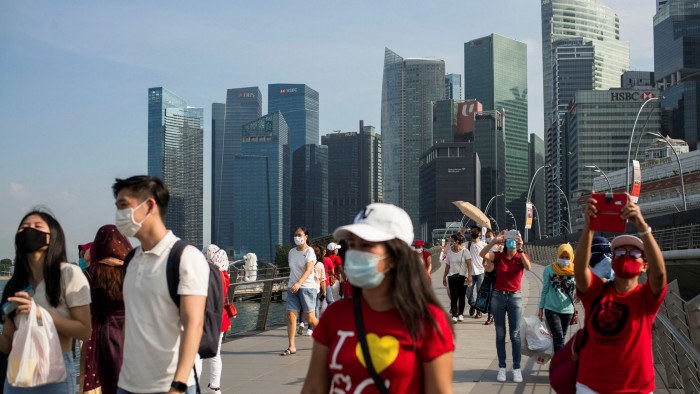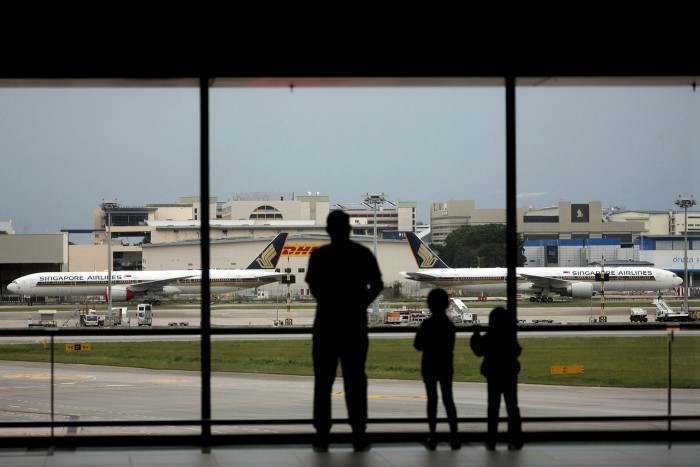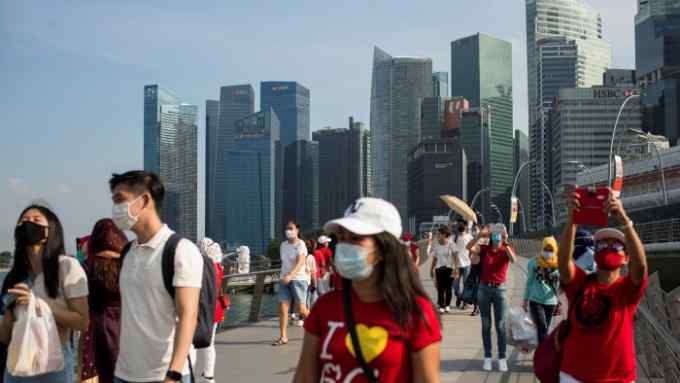A three-pronged plan to secure Singapore’s role in SE Asia

Roula Khalaf, Editor of the FT, selects her favourite stories in this weekly newsletter.
The Covid-19 pandemic has offered a timely reminder of both the limitations and the advantages of Singapore’s size, location and geopolitical positioning.
The short-term impact from coronavirus will be severe, with Singapore’s economy forecast to contract up to 7 per cent this year. But the pandemic has also highlighted the country’s resilience and appeal as a launch pad into Asia.
Singapore’s thorough surveillance of the disease, excellent healthcare system and effective public communications have helped it manage the crisis effectively.
Although Singapore initially won plaudits for its swift response to Covid-19, an outbreak in April tore through migrant workers’ dormitories. However, the country has maintained one of the world’s lowest fatality rates from the disease and its reputation for efficiency has been enhanced.
As international travel and trade recover, Singapore’s advantages as a regional hub will come to the fore. The air is clean, crime is low and politics is stable, making it an attractive place to establish regional offices and manufacturing. The population is highly educated and many people speak both English and Chinese. Its broadband internet speed is the fastest in the world.

These advantages are important but insufficient to maintain Singapore’s lead over potential rivals. South-east Asia is a fast-growing region, and by 2030 it is forecast to be the world’s fourth-biggest economy after China, the US and the EU. The value of south-east Asia’s internet economy alone has soared from $31bn in 2015 to $100bn last year.
Although Tencent, the Chinese tech group, recently chose Singapore as the location of a new office to support its regional expansion, the city-state faces intense competition to attract multinationals.
Huawei, for example, established its regional headquarters in Thailand, where it is bidding to develop the country’s 5G network. As the region grows more prosperous, multinationals may eye footholds in Bangkok or Kuala Lumpur, which offer similar tax incentives and cheaper office space.
There are three means for Singapore to consolidate its special role in the region in the face of such competition. The first is continued logistical innovation.
Land and labour are Singapore’s biggest constraints. Singapore has grown in part by reclaiming land from the sea. But this will soon be prohibitively expensive and its low birth rate means it is running out of native workers.
Singapore has found inventive ways of making the most of its advantages. A few years ago, for example, it won approval from the EU to fly chilled New Zealand lamb exports to Changi airport’s temperature-controlled cold rooms for onward sea shipment.
This combination of air and sea freight helps deliver the chops to British and German supermarkets with a long shelf life and at lower cost than using direct air shipments from New Zealand to Europe.
Such skilful logistical operations have established a lucrative niche in the trans-shipment of perishable goods by taking advantage of Singapore’s geographic location.
A second way for Singapore to strengthen its connections to the region lies in accelerating its shift to digital services.
For example, DBS, the city-state’s biggest bank, has launched a branchless mobile-led bank in Indonesia, with customers’ identity verified by agents using Indonesia’s biometric ID cards. The scheme was piloted in Singapore in 2015.
Moving more services online will allow Singapore’s companies to take advantage of opportunities in the region even when borders and offices are closed.
The third type of policy Singapore needs to pursue is a human one. During the early stages of the pandemic, Singapore’s reliance on short-term migrant workers was exposed. The government has acknowledged the need to improve their living conditions, and has paid the hospital bills of those who fell ill with Covid-19.
But the many men who build Singapore’s roads and women who collect their employers’ children from school face restricted lives. They are tied to a single employer, unable to bring their families with them, and have no pathway to becoming citizens.
Offering these workers a new deal, one that gives them a chance to become citizens — or at least long-term residents — of the country they work in, would benefit everyone.
It would help solve the demographic challenge, tapping into a potential source of skilled workers, and it would forge new ties of kinship between Singapore and countries in the region.
Jeevan Vasagar is a former Singapore Correspondent for the FT. He is writing a book about Singapore, due out in 2021.

Comments